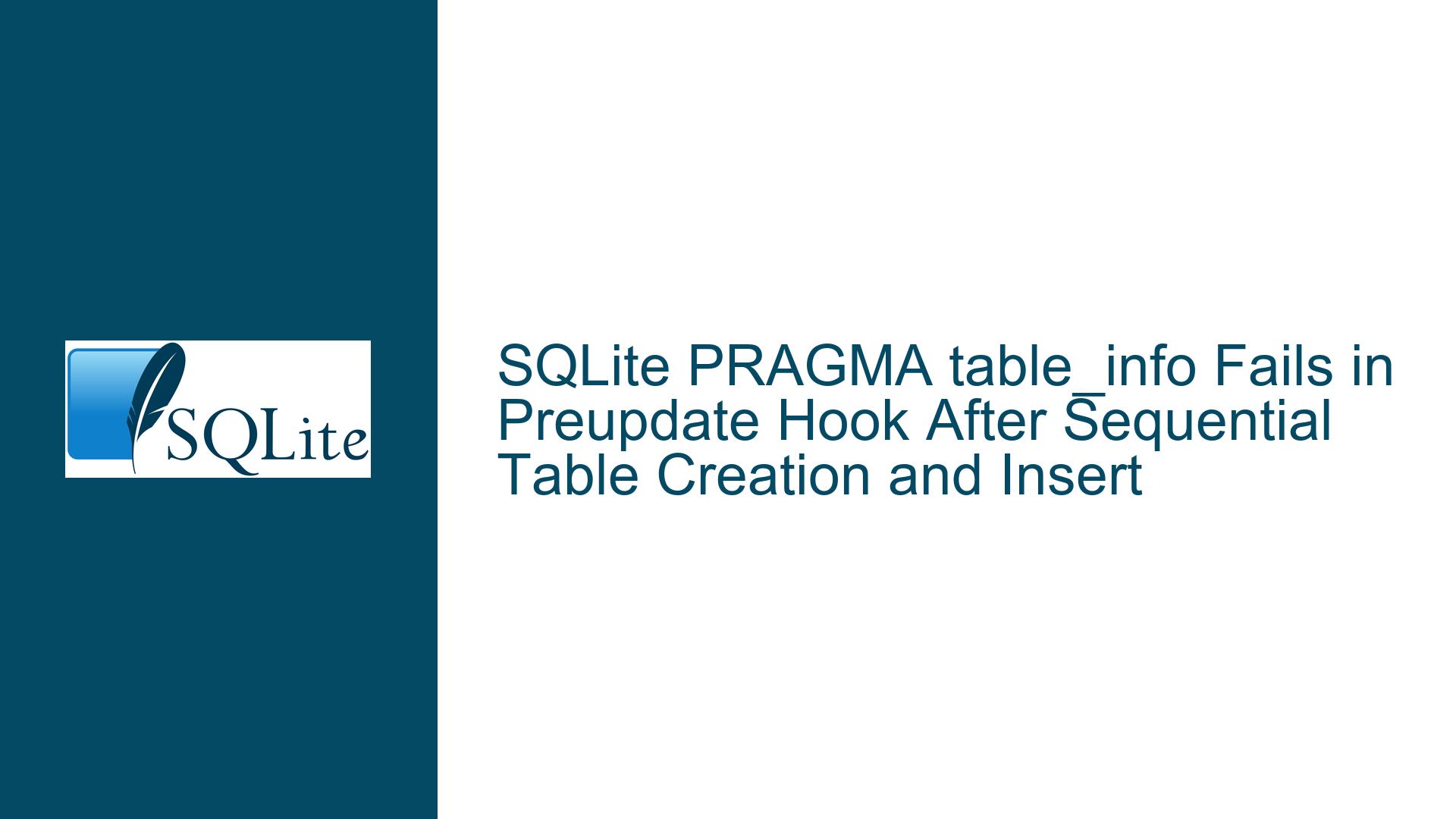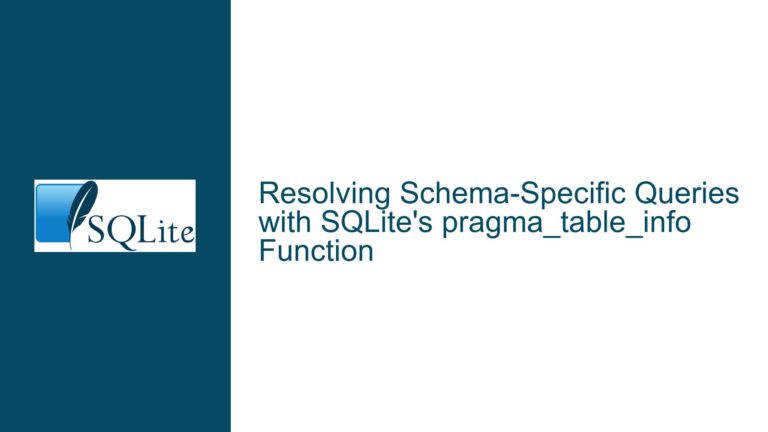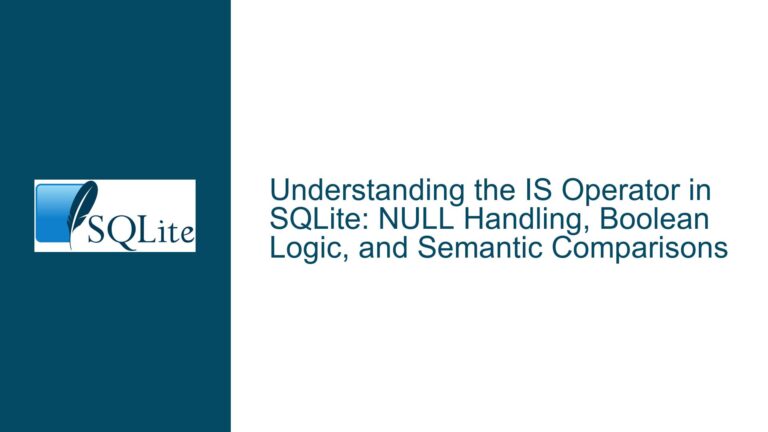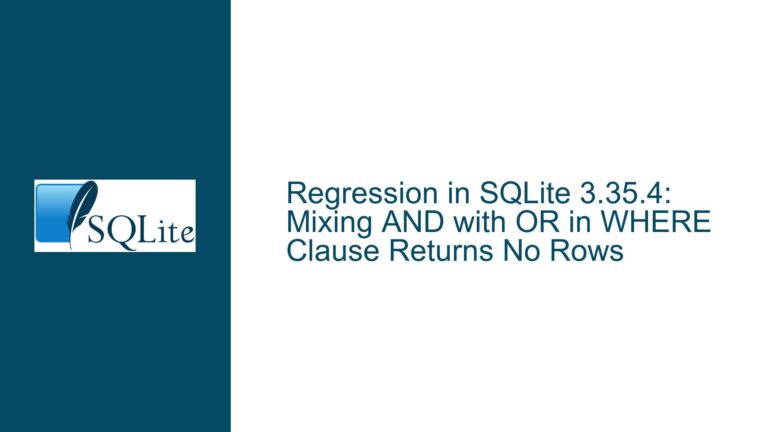SQLite PRAGMA table_info Fails in Preupdate Hook After Sequential Table Creation and Insert
PRAGMA table_info Fails During Preupdate Hook on Second Table Creation
The issue revolves around the use of PRAGMA table_info(tablename) within a preupdate hook in SQLite. The preupdate hook is designed to track changes made to the database, particularly during INSERT operations. The problem manifests when PRAGMA table_info(tablename) is used to retrieve table metadata within the preupdate hook. Specifically, the first call to PRAGMA table_info(tablename) works as expected, but subsequent calls fail when attempting to retrieve metadata for tables created after the first table. The failure is characterized by the API returning SQLITE_DONE instead of SQLITE_ROW, indicating that the API believes the table is empty or does not exist, even though the table has been successfully created.
The issue is particularly perplexing because replacing PRAGMA table_info(tablename) with an equivalent SELECT * FROM pragma_table_info(tablename) resolves the problem. This suggests that the issue is not with the table creation or the preupdate hook itself, but rather with how PRAGMA table_info(tablename) interacts with the SQLite API during the preupdate hook execution.
The problem is reproducible under specific conditions:
- A table is created (
CREATE TABLE A). - An
INSERToperation is performed on the newly created table, triggering the preupdate hook. - Within the preupdate hook,
PRAGMA table_info(A)is called and works as expected. - A second table is created (
CREATE TABLE B). - An
INSERToperation is performed on the second table, triggering the preupdate hook again. - Within the preupdate hook,
PRAGMA table_info(B)fails, returningSQLITE_DONE.
This sequence of operations indicates that the issue is related to the state of the SQLite database handle or the internal state of the SQLite engine when PRAGMA table_info(tablename) is called within the preupdate hook after multiple table creations and insertions.
Interrupted State Management in SQLite During Sequential Table Creation and Insert
The root cause of the issue appears to be related to the internal state management of SQLite during sequential table creation and insertion operations, particularly when PRAGMA table_info(tablename) is used within a preupdate hook. SQLite maintains a complex internal state to manage transactions, table metadata, and query execution. When a preupdate hook is triggered, SQLite is in a transitional state where it is preparing to execute an INSERT operation. During this state, certain operations, such as PRAGMA table_info(tablename), may not behave as expected due to the way SQLite manages its internal data structures.
One possible explanation is that SQLite’s internal schema cache is not being updated correctly when PRAGMA table_info(tablename) is called within the preupdate hook. The schema cache is a critical component of SQLite that stores metadata about tables, indexes, and other database objects. When a new table is created, SQLite updates its schema cache to reflect the new table’s structure. However, if PRAGMA table_info(tablename) is called within a preupdate hook, SQLite may not have fully updated its schema cache, leading to the incorrect behavior observed.
Another potential cause is related to the way SQLite handles transactions and statement finalization. When a table is created, SQLite implicitly starts a transaction to ensure atomicity. If PRAGMA table_info(tablename) is called within a preupdate hook while SQLite is still finalizing the previous statement or transaction, it may not have access to the updated schema information. This could explain why the first call to PRAGMA table_info(tablename) works, but subsequent calls fail.
The fact that replacing PRAGMA table_info(tablename) with SELECT * FROM pragma_table_info(tablename) resolves the issue suggests that the pragma_table_info function behaves differently under the hood. The pragma_table_info function is a table-valued function that retrieves table metadata in a way that is less dependent on SQLite’s internal state. This difference in behavior could be due to the way pragma_table_info interacts with SQLite’s schema cache or transaction management system.
Implementing Workarounds and Best Practices for PRAGMA table_info in Preupdate Hooks
To address the issue of PRAGMA table_info(tablename) failing within a preupdate hook, several workarounds and best practices can be implemented. These solutions aim to ensure that table metadata is retrieved correctly, regardless of the internal state of SQLite during the preupdate hook execution.
Use SELECT * FROM pragma_table_info(tablename) Instead of PRAGMA table_info(tablename)
The most straightforward solution is to replace PRAGMA table_info(tablename) with SELECT * FROM pragma_table_info(tablename) within the preupdate hook. This approach has been shown to work consistently, even in scenarios where PRAGMA table_info(tablename) fails. The pragma_table_info function is a table-valued function that retrieves table metadata in a way that is less dependent on SQLite’s internal state, making it more reliable in this context.
Ensure Proper Statement Finalization and Transaction Management
Another approach is to ensure that all previous statements are properly finalized before calling PRAGMA table_info(tablename) within the preupdate hook. This can be achieved by explicitly finalizing statements and managing transactions carefully. For example, after creating a table, you can explicitly finalize the CREATE TABLE statement before proceeding with the INSERT operation. This ensures that SQLite’s internal state is consistent and that the schema cache is updated correctly.
Use Separate Database Handles for Schema Operations
Using separate database handles for schema operations (such as CREATE TABLE) and data operations (such as INSERT) can also help mitigate the issue. By isolating schema changes from data changes, you can ensure that the schema cache is updated correctly before any data operations are performed. This approach involves creating a separate database handle for schema changes and another handle for data operations. The preupdate hook can then be installed on the data operation handle, ensuring that PRAGMA table_info(tablename) is called in a consistent state.
Implement a Schema Cache Refresh Mechanism
In some cases, it may be necessary to implement a schema cache refresh mechanism to ensure that SQLite’s internal schema cache is up-to-date before calling PRAGMA table_info(tablename). This can be achieved by executing a dummy query that forces SQLite to refresh its schema cache. For example, you can execute a SELECT * FROM sqlite_master query before calling PRAGMA table_info(tablename) within the preupdate hook. This ensures that the schema cache is updated and that PRAGMA table_info(tablename) returns the correct results.
Example Implementation
Below is an example implementation that demonstrates how to use SELECT * FROM pragma_table_info(tablename) within a preupdate hook to retrieve table metadata reliably:
#include <sqlite3.h>
#include <stdio.h>
// Preupdate hook function
void preupdate_hook(void *pCtx, sqlite3 *db, int op, char const *zDb, char const *zTable, sqlite3_int64 iKey1, sqlite3_int64 iKey2) {
if (op == SQLITE_INSERT) {
// Retrieve table metadata using pragma_table_info
sqlite3_stmt *stmt;
const char *sql = "SELECT * FROM pragma_table_info(?)";
if (sqlite3_prepare_v2(db, sql, -1, &stmt, NULL) == SQLITE_OK) {
sqlite3_bind_text(stmt, 1, zTable, -1, SQLITE_STATIC);
while (sqlite3_step(stmt) == SQLITE_ROW) {
// Process table metadata
const char *name = (const char *)sqlite3_column_text(stmt, 1);
const char *type = (const char *)sqlite3_column_text(stmt, 2);
printf("Column: %s, Type: %s\n", name, type);
}
sqlite3_finalize(stmt);
}
}
}
int main() {
sqlite3 *db;
if (sqlite3_open(":memory:", &db) == SQLITE_OK) {
// Install preupdate hook
sqlite3_preupdate_hook(db, preupdate_hook, NULL);
// Create tables and insert data
sqlite3_exec(db, "CREATE TABLE dogs (tag INTEGER PRIMARY KEY, name TEXT, age INT, height REAL);", NULL, NULL, NULL);
sqlite3_exec(db, "INSERT INTO dogs (name, age, height) VALUES ('Scooby', 8, 0.8);", NULL, NULL, NULL);
sqlite3_exec(db, "CREATE TABLE people (rowid INTEGER PRIMARY KEY, name TEXT, age INT, height REAL);", NULL, NULL, NULL);
sqlite3_exec(db, "INSERT INTO people (name, age, height) VALUES ('John', 30, 1.8);", NULL, NULL, NULL);
sqlite3_close(db);
}
return 0;
}
In this example, the preupdate hook uses SELECT * FROM pragma_table_info(tablename) to retrieve table metadata reliably. This approach ensures that the table metadata is retrieved correctly, even in scenarios where PRAGMA table_info(tablename) would fail.
Conclusion
The issue of PRAGMA table_info(tablename) failing within a preupdate hook is a complex one, rooted in the internal state management of SQLite during sequential table creation and insertion operations. By understanding the underlying causes and implementing the appropriate workarounds, you can ensure that table metadata is retrieved reliably within the preupdate hook. Whether you choose to use SELECT * FROM pragma_table_info(tablename), manage transactions carefully, or implement a schema cache refresh mechanism, the key is to ensure that SQLite’s internal state is consistent and that the schema cache is up-to-date before retrieving table metadata.






